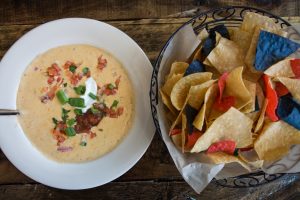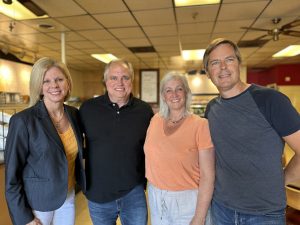Below is the winning entry, entries 2-5 can be found here.
Sacramental Salad by Richard McKean
We never ate it in our home. Heard about it in an Elvis song, knew what it looked like, and knew it grew everywhere, but it never made it to our supper table. That by the way should be a testament of our hayseediness, not that we were familiar with poke salad, but that dinner was lunch and supper was dinner. No denying, country as sugar sandwiches.
Driving soldiers from Camp Robinson initiated my grandparents move to the city from a sharecropper’s life in Searcy. They settled in a corner home at the intersection of 13th and Cedar alongside a family of ten. The father was a big wig at Coleman Dairy and wealthy by our standards. Across 13th, Mr. and Mrs. H. lived and retired. Cattycorner from them were two fellas that taught school. I never knew much about them, but under no circumstances was I to talk to either. Something about their shoes my grandfather would never tell me. Behind our house, across the alley dividing 13th and 14th, in a lean-to with a porch, a widow named Lela Johnson lived with her son, Rodney. And lining the alleyway, a bush with small purple berries old folks called Poke Sallet.
Granny told me it was poisonous, and never eat, or even touch the berries. However, Mrs. Johnson gathered it in Weingartens’ bags and toted it home. I‘d seen Rodney whack it down all summer long. What were they doing with it? Then after speaking to Mrs. Johnson in the yard with her sack full, Granny told me it was something only colored people could eat. She of course didn’t say colored, and gullible as I was, I never asked again.
Years later, on the soundtrack of my mind’s eye, it was that day I was made aware of a caste and class system in The South. It backfired at first though. Indeed, the Johnsons were different after that. They had to be, they could eat poke salad. But in my blissful ignorance, I reversely reckoned Rodney to be a super human, capable of stomaching anything. I followed him around from then on. He and I tossed a football in the street. We listened to Casey Kasem’s American Top Forty on Saturday mornings. He taught me to strum a guitar, blow a bazooka bubble, spin a yo-yo, and though five years my senior, and big as a bull, we rode bicycles together in the neighborhood. He taught me so much. Thankfully, children are born colorblind.
Several summers passed, and like the plague, racism infected my unimmunized attention. Now the Johnsons were extremely different in an extremely unadorned way. “Light loafers” lived across the street. “Kikes” hoarded their money in the H’s household. Bag boys at Weingartens were referred to as “tar babies” by my grandpa, and even Rodney, who my grandparents really seemed to really like, was a “porch monkey” when he wasn’t around. By 1970, at the age of eight, I had been culturally contaminated.
But you know, Mrs. Johnson never swayed. She still called me baby, still wore that same tattered dress, and still asked about my father who was still in Viet-Nam. As for Rodney, he couldn’t be disliked if I tried. He still had an aura of greatness. He was now a star athlete at Central High School and he treated me as he always had. We still tossed the pigskin, still watched Soul Train, still shot hoops in the alley, and like a thousand times before, still had to retrieve the basketball from that ever present, ever mysterious, ever poisoned Poke Salad in the alley.
Then on the day my father returned from overseas, January 17th, 1972, by the grace of God, Mrs. Johnson came to our back door with several covered dishes. She knew my grandparents had gone to the air base in Jacksonville, so to save my Grandmother the trouble, she brought supper over. She loved my father dearly from the time his family moved in, just as she did me. She had tears of joy in her eyes when she handed me the food. She said she prayed for dad every night since he left for boot camp, and now her prayers were being answered. “God is good baby,” was her catch phrase. Fortuitously, I was home alone, and since I was bussed clear across town to school, it was nearly five in the evening. I asked Mrs. Johnson to come inside but she wouldn’t. In Twenty-five years she never had, why break tradition? She brought with her a cast iron skillet of cracklin’ cornbread, that to this day was the best I’ve ever eaten, a huge platter of fried chicken, back’s included, and a covered pot. I knew what it was. I lifted the lid, and there was my ultimate culinary concern, Poke Sallet and hog jowls.
I’m deeply saddened now for never properly thanking her, and I hope she knew I adored her. She was the greatest provider of love and understanding I ever had in my life. I cried like a child on the deck of The USS Kennedy the day I got the news she’d passed. That day at the back door runs over and over in my mind to this day. She wasn’t there when my Dad arrived, and I was sitting alone at the table, elbow deep in my dinner with cornbread crumbs on the floor and chicken bones beside my plate. I was sanctifiably stuffed. More importantly, I was washed in the juice of redemption. I may have been lost for a while, but now I was found. I once was blind, but after that day, I ate with my eyes wide open. My life, my outlook, my senses, my vocabulary, my compassion, all that changed on my own back porch. I had conquered the insurmountable. God inside that covered dish was truly good baby. I had at last partaken of Mrs. Lela Johnson’s sacramental Salad.





